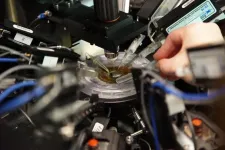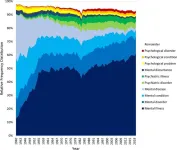(Press-News.org) NRG Oncology recently reported the results from the radiotherapy randomization, which was the second step of their NRG-RTOG 0848 clinical study comparing adjuvant chemotherapy with or without chemoradiation for patients with resected periampullary pancreatic adenocarcinoma. The trial data did not show that the addition of radiation and chemotherapy to adjuvant systemic therapy improved overall survival (OS) for all patients on the study, however, OS was improved among node-negative patients. OS was essentially the same between treatment arms for node positive patients. The trial data also showed that disease-free survival (DFS) was improved with the addition of radiation and chemotherapy to adjuvant systemic therapy, driven by the DFS improvement in node negative patients. The addition of chemoradiation did not increase grade 4 or 5 adverse events. These results were presented as at the American Society of Clinical Oncology (ASCO) 2024 Annual Meeting in Chicago, Illinois, and was distinguished as a “Best of ASCO” abstract.
“This trial was initially designed to address the need for a more effective and tolerable adjuvant systemic therapy for pancreatic cancer. When this study was developed, gemcitabine was the only effective treatment available, and this treatment commonly corresponds with distant and local failures for this patient population. Therefore, we designed NRG-RTOG 0848 to evaluate the role of adjuvant radiation with 5-fluorouracil (5-FU) or capecitabine following surgical resection and adjuvant systemic treatment to see if this additional treatment would further improve survival outcomes for patients,” stated Ross A. Abrams, MD, the Principal Investigator of the NRG-RTOG 0848 study.
NRG-RTOG 0848 treatment started with 5 cycles of systemic treatment, initially randomizing patients at step 1 to either Arm 1 to receive gemcitabine alone or Arm 2 to receive gemcitabine with erlotinib. Following the results of the LAP07 trial (Hammel 2013), the erlotinib randomization was stopped and all patients were registered at step 1 to receive gemcitabine alone. Two years later the trial was amended to allow oxali-based combination chemotherapy regimens.
Following step one, patients were evaluated to confirm if there was no disease progression. Non-progressing patients were stratified by nodal status, CA19-9, surgical margins, and adjuvant systemic therapy. Following stratification, patients were then randomly assigned to receive radiotherapy for one month on either Arm 3 (Chemo), including gemcitabine or combination chemotherapy, or Arm 4 (Chemo+CRT), receiving gemcitabine or combination chemotherapy followed by chemoradiation with either capecitabine or 5-FU.
There were 354 patients included in the step 2 randomization of the NRG-RTOG 0848 study and median follow-up was 2.2 years for all patients (0.02-12.8) and 7.4 years for living patients (0.02-12.8. The primary endpoint for the trial was OS, which was only improved for patients with node-negative disease (5-year OS 48.1% for patients on the Chemo+CRT arm versus 28.6% on the Chemo arm). Node-positive patients on the study did not experience an improvement in OS. DFS was improved for all patients, driven by the node-negative patients (5-year DFS 21.4% for patients on the chemo+CRT arm versus 15.2% on the Chemo arm. Patterns of failure will be examined. Grade 4 and 5 adverse events reported were similar on both treatment arms (5% on the Chemo arm and 6% on the Chemo+CRT arm).
“The results of NRG-RTOG 0848 suggests that, with the appropriate planning and considerations, chemoradiation could be utilized in further testing for future adjuvant and neoadjuvant trials,” Dr. Abrams added.
Future research is needed to assess an alternative way to improve DFS and OS for node-positive patients that are at a high-risk of disease progression. Additionally, it would be worthwhile to investigate if adjuvant could derive more of a benefit in these patient populations if combined with a more effective systemic therapy.
This project was supported by grants U10CA180868 (NRG Oncology Operations), U10CA180822 (NRG Oncology SDMC), UG1CA189867 (NCORP), U24CA180803 (IROC) from the National Cancer Institute (NCI), part of the National Institutes of Health.
Citation
Abrams RA, Winter KA, Goodman KA, Regine WF, Safran HP, Berger AC, Guha CS, Kachnic LA, Gillin MT, Seaward SA, Wu AJ, Wu JJ, Aljumaily RM, Dipetrillo TA, Geva R, Anne PR, Yannucci J, Liles DK, Moughan J, Crane CH. (2022, October). Results of Adjuvant Chemotherapy +/- Chemoradiation for Patients with Resected Periampullary Pancreatic Adenocarcinoma: NRG Oncology/RTOG 0848. Paper presented at the annual meeting of the American Society of Clinical Oncology. Chicago, IL.
About NRG Oncology
NRG Oncology conducts practice-changing, multi-institutional clinical and translational research to improve the lives of patients with cancer. Founded in 2012, NRG Oncology is a Pennsylvania-based nonprofit corporation that integrates the research of the legacy National Surgical Adjuvant Breast and Bowel Project (NSABP), Radiation Therapy Oncology Group (RTOG), and Gynecologic Oncology Group (GOG) programs. The research network seeks to carry out clinical trials with emphases on gender-specific malignancies, including gynecologic, breast, and prostate cancers, and on localized or locally advanced cancers of all types. NRG Oncology’s extensive research organization comprises multidisciplinary investigators, including medical oncologists, radiation oncologists, surgeons, physicists, pathologists, and statisticians, and encompasses more than 1,300 research sites located world-wide with predominance in the United States and Canada. NRG Oncology is supported primarily through grants from the National Cancer Institute (NCI) and is one of five research groups in the NCI’s National Clinical Trials Network.
www.nrgoncology.org
END
NRG Oncology abstract considered “best of ASCO” for 2024 shows difference in outcomes for node-negative versus node-positive pancreatic cancer patients when adding chemoradiation to systemic therapy
2024-06-04
ELSE PRESS RELEASES FROM THIS DATE:
Emma Guttman-Yassky, MD, Ph.D., receives high honor at European Academy of Allergy and Clinical Immunology
2024-06-04
Emma Guttman-Yassky, MD, PhD, Receives High Honor at European Academy of Allergy and Clinical Immunology
The Paul Ehrlich Award for Experimental Research recognizes scientists who have revolutionized the understanding of allergic diseases and immunological mechanisms.
New York, NY (June 4, 2024) – The 2024 European Academy of Allergy and Clinical Immunology (EAACI) Annual Congress selected Emma Guttman-Yassky, MD, PhD, Waldman Chair of the Kimberly and Eric J. Waldman Department of Dermatology, and Professor of Dermatology and Immunology, Icahn School of Medicine at Mount Sinai, as the recipient of the ...
An anti-inflammatory curbs spread of fungi causing serious blood infections
2024-06-04
A team of UC Davis Health researchers discovered that a common anti-inflammatory drug, mesalamine, can replace the work of good bacteria in fighting the nasty fungus Candida albicans in the gut.
C. albicans, or candida, is known to cause yeast infections. In some cases, it develops into invasive candidiasis, a potentially fatal infection occurring mostly in patients with compromised immunity.
The researchers found that this fungus can’t grow without an oxygen supply. Their study in mice showed that the drug can ...
Intracerebral hemorrhage stroke outcomes improve with early minimally invasive surgery evaluated in clinical trial
2024-06-04
INDIANAPOLIS – Patients with an intracerebral hemorrhage have better medical outcomes when surgeons perform an early minimally invasive removal of a hematoma compared to those receiving the standard of care, according to a study published in the New England Journal of Medicine.
Indiana University School of Medicine faculty clinicians Mitesh Shah, MD, Bradley Bohnstedt, MD, Regg Singh, MD and Jason Allen, MD, PhD are co-authors ...
UC San Diego Health first in region to provide novel therapy for melanoma
2024-06-04
UC San Diego Health is the first hospital system in the region to offer a new immunotherapy treatment for metastatic melanoma. The personalized cellular therapy derived from tumor infiltrating lymphocytes (TIL), is the first solid tumor therapy on the market approved by the U.S. Food and Drug Administration (FDA).
“This one-time cellular immunotherapy is a powerful and robust tool to treat patients with advanced melanoma resistant to other approved therapies and who have limited treatment options,” said Gregory Daniels, MD, PhD, professor of ...
Zapping the right brain cells: The path to improved stimulation
2024-06-04
By Jake Siegel
SEATTLE, WASH.—June 4, 2024—New research by scientists at the Allen Institute’s Brain and Consciousness group and Cedars-Sinai offers an unprecedented look at how neurons respond to ES. Far from being uniform, different types of neurons showed distinct patterns of ‘syncing up’ with electrical fields. These patterns varied depending on the rate at which the ES was delivered.
The findings, published today in Neuron, could help doctors fine tune where, when, and how ...
How an Indian government policy backfired: the unintended consequences of price regulation of prescription drugs
2024-06-04
Researchers from Indian Institute of Management Calcutta, University of Chicago, and Management Development Institute, Gurgaon published a new Journal of Marketing study that examines the unintended consequences of an Indian government healthcare policy.
The study, forthcoming in the Journal of Marketing, is titled “Do No Harm? Unintended Consequences of Pharmaceutical Price Regulation in India” and is authored by Saravana Jaikumar, Pradeep K. Chintagunta, and Arvind Sahay.
In countries without universal health insurance or developed health care systems, governments try to make drugs affordable and accessible. For instance, ...
Exercising during pregnancy normalizes eating behaviors in offspring from obese mice
2024-06-04
Maternal obesity impacts the eating behaviors of offspring via long-term overexpression of the microRNA miR-505-5p, according to a study publishing June 4th in the open-access journal PLOS Biology by Laura Dearden and Susan Ozanne from the MRC Metabolic Diseases Unit, Institute of Metabolic Science, University of Cambridge, UK, and colleagues.
Previous studies in both humans and animal models have shown that the offspring of obese mothers have a higher risk of obesity and type 2 diabetes. While this relationship is likely the result of a complex relationship between genetics and environment, emerging ...
Managing mental health should be about more than mind
2024-06-04
Clinicians often default to treating mental health conditions with a variety of medication. This approach, however, largely ignores the role of environment, lifestyle, and social factors. Mental Health professionals must work toward a more holistic management picture, Sidarta Ribeiro, Ana Paula Pimentel, Paulo Amarante and colleagues at the Federal University of Rio Grande do Norte, Federal University of Rio de Janeiro and FIOCRUZ in Brazil argue in the new open-access journal PLOS Mental Health on June 4.
More people than ever are being diagnosed with mental health conditions—particularly children and young adults. The World Health Organization estimates that mental health ...
Signaling between brain regions altered in teenage internet addiction
2024-06-04
Max Chang and Irene Lee of University College London review neuroimaging studies of the effects of internet addiction on adolescent brains. Published June 4 in PLOS Mental Health, the study indicates that internet addiction is associated with disrupted signaling in the regions of the brain that are involved in multiple neural networks. These networks play an important role in controlling our attention, in association with intellectual ability, working memory, physical coordination, and emotional processing—all of which ...
In “mental illness” and “mental health”: how language around psychiatric conditions shifts
2024-06-04
A new survey of nearly 340,000 texts spanning 79 years shows that generic terms in mental health have shifted away from words like “disease” and “disturbance” and toward “psychiatric” and “mental health,” with “mental illness” becoming the most-used term. Nick Haslam and Naomi Baes at the University of Melbourne in Australia present these findings in the new open-access journal PLOS Mental Health on June 4.
The authors state that while words such as “crazy” and “lunatic” ...




